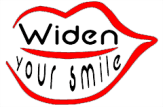TMJ/TMD Symptoms: Neck and Shoulder Pain
Having a ‘bad bite’ (malocclusion) causes an imbalance in the jaw-to-skull relationship, which in turn twists the jaw into a strained position that refers pain to the muscles in the neck, shoulders, and back.
Muscles work as a team. Seldom does a single muscle work without other muscles in the team joining in. The bones in the neck, especially the atlas and axis, are intimately involved with the muscles of chewing, biting, talking, breathing, and head posture. Sore, tight, contracted muscles of the jaw will tilt the head and shoulders causing compensation from neck, shoulder and back muscles. Although we do not claim to cure neck, back, shoulder, or arm pain, patients are pleased how frequently these problems can be relieved.
Dr. Widen understands that the bones, joints, muscles, and nerves in the face and neck have a complex relationship. He works to correct the bite with orthopedics, relieving strain on the jaw and the surrounding muscles. Once the bite has been aligned, resulting pain in many areas of the body disappears.
 | Dr. Ronald Widen
| Dr. Ronald Widen